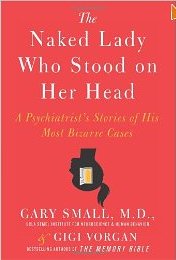October 17th, 2010 by Dinah Miller, M.D. in Better Health Network, Book Reviews, Opinion, True Stories
No Comments »


 I just finished reading Dr. Gary Small’s book, The Naked Lady Who Stood On Her Head.
I just finished reading Dr. Gary Small’s book, The Naked Lady Who Stood On Her Head.
In the final chapter of the book, Dr. Small talks about his mentor, friend, and father figure who’s mentioned throughout the book. The mentor approaches him on the golf course, where they meet to talk, and says he needs psychotherapy and Small is the man to do it. The author is surprised, hesitant, and a bit uncomfortable with the demand (it comes as more than a request.) His wife likens it to the need for a plumber or a dentist, and Dr. Small takes on the task. The mentor calls all the shots: Where the meetings will be, what pastry they will eat, the form of his payment. The author initially misses the diagnosis and uses this as an example of how one can be blinded.
So is it okay for a friend to treat a friend? Read more »
*This blog post was originally published at Shrink Rap*
October 11th, 2010 by Dinah Miller, M.D. in Better Health Network, Health Policy, Opinion
No Comments »


 Look, he came back! Guest blogger Mitchell Newmark, M.D., put on his armor and came to blog with us again.
Look, he came back! Guest blogger Mitchell Newmark, M.D., put on his armor and came to blog with us again.
The Relative Unimportance of Diagnosis In Psychiatry
As we will soon be witness to the emergence of DSM-V, the new rule book for psychiatric diagnosis, I am reminded of all the pitfalls of diagnosis in psychiatry. In other fields of medicine, diagnosis is based primarily on etiology, with objective findings, rather than on symptoms alone, as it is in psychiatry. When you go to your internist with stomach pain, there’s an endoscopy to look for ulcers, a sonogram to look for gall stones, a blood test to look for hepatitis. But in psychiatry, there is no CT scan to check for bipolar disorder, no blood test to assess if the patient has schizophrenia, no spinal tap to check for major depression.
For the psychiatric community at large, diagnosis is important for many reasons. It helps doctors sort out patients so that clinical trials can be conducted on similar groups of patients. It enhances communication among psychiatrists when behavioral, affective and cognitive symptoms can be categorized. But for the individual patient, it is less useful. Some patients fit nicely into DSM categories, and others don’t. There are many patients who have unique combinations of symptoms across several diagnostic criteria. This leads to assigning multiple diagnoses, and confusing the treatment picture. Read more »
*This blog post was originally published at Shrink Rap*
July 6th, 2010 by Steven Roy Daviss, M.D. in Better Health Network, Health Tips, True Stories
No Comments »



Here’s a story that came out of the American Psychological Association (APA) conference:
I was in a cab going to dinner. The cab driver found out I was a psychiatrist so he told me about his life-changing experience with therapy.
At one time he was having an incredible problem with his life. He was using cocaine, couldn’t keep a job, and his relationships were going down the tubes. Therapy helped him quit cocaine and change all that. (Which was good, since he was the driver of my cab. I really wanted him not to be high or in distress.) This kind of turn-around story isn’t unusual for me — parolees will often come back and tell me about things they’ve done in free society that they’re proud of. The unusual part of this story is the fact that he made all of these changes after a single one-hour session. Read more »
*This blog post was originally published at Shrink Rap*

 I just finished reading Dr. Gary Small’s book, The Naked Lady Who Stood On Her Head.
I just finished reading Dr. Gary Small’s book, The Naked Lady Who Stood On Her Head.










